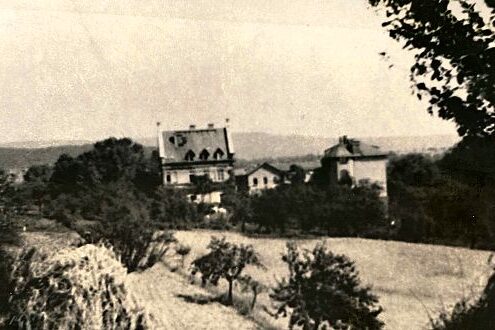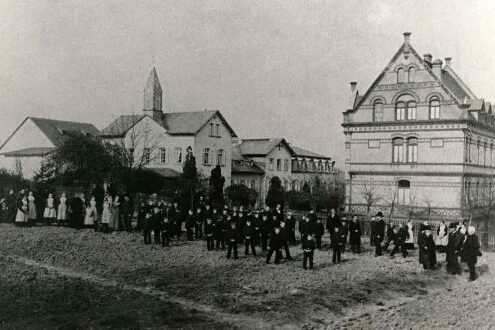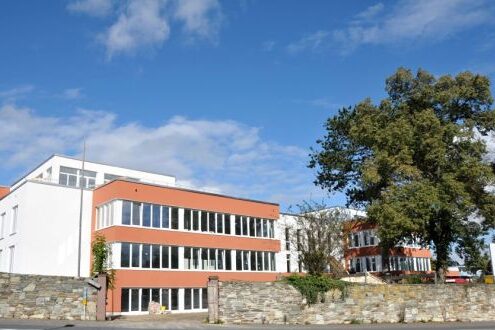EVIM
Founded by EVIM in 1853, the Children's Rescue Home on the Geisberg was the first facility of the Nassau Inner Mission in Wiesbaden. Today, it is responsible for a large number of social projects.
The Evangelical Association for Inner Mission Nassau (EVIM) is an association of younger pastors in Nassau, founded on November 11, 1850, who sought a new beginning and a revitalization of church life.
After internal battles, Ludwig Eibach was elected chairman in 1851 and held this office until his death in 1868. The association acted in accordance with the Augsburg Confession of 1530 and saw its task as "caring for and strengthening the physically and emotionally afflicted". Members were to become active in the social and charitable sector not only with donations, but also with "personal activity" and above all to care for "the poor, the sick, the neglected, the abandoned and the outcasts".
The founding of the association made a contribution in the spiritual and social field to combating the negative consequences of the industrialization process, the impoverishment of the proletariat and the exploitation of child labour. The social question had become a major problem in Germany, a problem to which the ruling social classes knew no answer. Among the countless people who, conscious of their Christian faith, felt the responsibility to act, it was the Protestant theologian Johann Hinrich Wichern who was one of the first to co-found the well-known rescue home for children, the "Rauhe Haus", in Hamburg in 1833 and took over its management. This house was the model for the emergence of over 100 rescue homes throughout Germany in the short period up to 1855. The rescue homes had the task of saving neglected children and orphans from physical and spiritual ruin through a Christian upbringing in an orderly home life.
Ludwig Eibach is credited with creating such a rescue home in Wiesbaden, east of Idsteiner Straße, together with the members of his association. It was inaugurated on November 10, 1853 and for a long time could only be maintained through donations and collections.
The fact that Ludwig Eibach enjoyed the trust and goodwill of the ducal family in Wiesbaden as the teacher of Prince Wilhelm and Princess Hilda von Nassau was of considerable importance. Through their mediation, two Kaiserswerth sisters came to Wiesbaden, with whose help a community diaconia could be established. No less important was the connection to Theodor Fliedner, who had opened the deaconess motherhouse in Kaiserswerth in 1836, where young girls were trained for a career in nursing and service to the community. His sister Karoline Fliedner was Eibach's first voluntary parish nurse in Wiesbaden. In 1865, the "Oranien - Verlag", as it was later called, was founded in Herborn for the Protestant publishing work throughout Nassau.
The annexation of Nassau by Prussia in 1866 marked the beginning of a new era. The Prussian Compulsory Education Act of 1878 regulated the placement of neglected children and led to minimal funding from the local authorities.
On October 26, 1879, the association founded the "Herberge zur Heimat" in Platter Straße in Wiesbaden, a Christian hospice for wandering craftsmen, workers and employees, a building that still exists today as the Hotel Oranien. In the following years, the association was able to expand its activities in the area of the old Nassau region. In addition to Wiesbaden, the focus was on Biebrich, Herborn, Haiger, Dillenburg, Diez, Bad Ems, Kaub, Bad Homburg, Bad Schwalbach, Usingen and Westerburg.
After the National Socialist era, which also took a heavy toll on the association's facilities, funding was put on a new and firm footing under federal legislation. Today, the association's work is guided by the motto "We are there where people need us".
EVIM is responsible for a large number of facilities, some of which have become legally independent in recent years, either individually or as a group, but all of which are operated by the association in the form of a holding company together with its subsidiaries. The focus is on care for the elderly, the disabled, youth welfare and education.
In Wiesbaden, the Ludwig-Eibach-Haus, the Johann-Hinrich-Wichern-Stift, the Alzheimer's Day Center, the Katharinenstift in Biebrich and the Jan-Niemöller-Haus in Schierstein are all part of the elderly care service. Other elderly care facilities include the Gertrud-Bucher-Haus in Westerburg, the Flersheim-Stiftung in Bad Homburg and the Kortheuer Haus in Usingen. The association has senior centers in Hattersheim, Hochheim, Kostheim, Schwalbach a. T. and Walluf. There are also assisted living facilities throughout the region as well as outpatient care for the elderly.
In particular, the Reha-Werkstatt in Wiesbaden and the Schlocker-Stiftung in Hattersheim are part of the disability assistance program. In connection with this, there are also a number of residential homes for the disabled in Wiesbaden and Hattersheim. The program in this sector is supplemented by various community psychiatric facilities in Wiesbaden and Hofheim.
The youth welfare service maintains various residential groups, provides individual educational support and inpatient care in the Rhine-Main region. The "Upstairs" project aims to help homeless children and young people reintegrate into family and society. Closely linked to youth welfare is the area of education, which focuses on the work of the state-approved special school for educational assistance on the #Geisberg in Wiesbaden, the school for children of professional travelers and a campus project (Campus Klarenthal).
EVIM sees the development of a Christian-based, reform-oriented youth education from nursery school to kindergarten and elementary school as well as secondary levels 1 and 2 through to the Abitur (Campus Klarenthal) as a necessary complement to Christian-based social work.
Literature
- Pfeiffer, Wilfried und Schmidt–von Rhein, Georg
"Love never ends". 150 years of the Evangelical Association for Inner Mission in Nassau, Wiesbaden 2000.
- Evangelischer Verein für Innere Mission Nassau
We are there where people need us, Wiesbaden 2004.


